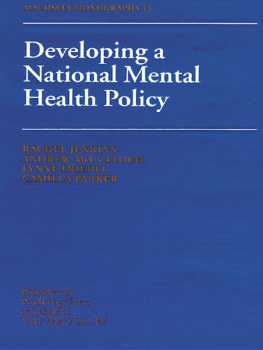This edition published in the Taylor & Francis e-Library, 2005.
To purchase your own copy of this or any of Taylor & Francis or Routledges collection of thousands of eBooks please go to www.eBookstore.tandf.co.uk.
Copyright 2002 by Psychology Press Ltd
a member of the Taylor & Francis Group
All rights reserved. No part of this book may be reproduced in any form, by photostat, microform, retrieval system, or any other means without the prior written permission of the publisher.
Psychology Press Ltd, Publishers
27 Church Road
Hove
East Sussex, BN3 2FA
UK
First received: May 2000
Final revision: February 2001
Pre-publication copy requested by Editor-in-chief, World Health Report, March 2001
British Library Cataloguing in Publication Data
A catalogue record for this book is available from the British Library
Library of Congress Cataloging in Publication Data
Developing a national mental health policy / Rachel Jenkins [et al.].
p. cm. (Maudsley monographs ; no. 43)
Includes bibliographical references and index.
ISBN 1-84169-295-6
1. Mental health policyUnited States. 2. Mental health planningUnited States. I. Jenkins, Rachel. II. Series.
RA790.6 .D48 2002
362.2'0973dc21
2001048476
ISBN 0-203-98937-6 Master e-book ISBN
ISBN 1-84169-295-6 (Print Edition)
ISSN 0076-5465
MAUDSLEY MONOGRAPHS
HENRY MAUDSLEY, from whom the series of monographs takes its name, was the founder of The Maudsley Hospital and the most prominent English psychiatrist of his generation. The Maudsley Hospital was united with the Bethlem Royal Hospital in 1948 and its medical school, renamed the Institute of Psychiatry at the same time, became a constituent part of the British Postgraduate Medical Federation. It is now associated with Kings College, London, and entrusted with the duty of advancing psychiatry by teaching and research. The Bethlem-Maudsley NHS Trust, together with the Institute of Psychiatry, are jointly known as The Maudsley.
The monograph series reports work carried out at The Maudsley. Some of the monographs are directly concerned with clinical problems; others, less obviously relevant, are in scientific fields that are cultivated for the furtherance of psychiatry.
Editor
Professor Sir David Goldberg MA DM MSc FRCP FRCPsych DPM
Assistant Editors
Professor A S David MPhil MSc FRCP MRCPsych MD Dr T Wykes BSc PhD MPhil
Acknowledgements
We gratefully acknowledge contributions from Dr Gyles Glover (the main author of the section on mental health information systems); Dr Geraldine Strathdee, who contributed to the section on primary care; Dr Florence Muja and Betty Bigombe, who both contributed to the section on trauma; and Mary Hancock, who wrote the section on the contribution of religious groups and churches to the care and support of people with mental illness. Rebecca Bazeley, a voluntary researcher working for Dr McCulloch, helped to develop the typology of the different cultural and historical views of mental health problems. We are very grateful to Derek Flannery for his work checking and collating references.
Foreword 1
Mental illness causes a substantial health burden in all regions of the world. This burden is not only from disability and suicide, but also from the loss of economic productivity, family burden, reduced access to and success of health promotion, prevention and treatment programmes, and mortality from the associated vulnerability to physical disease, including infectious diseases.
The goal of DFID is the alleviation of poverty. Mental health differentially affects the poor and impedes the achievement of other health and development targets. Therefore DFID welcomes the timely publication of this important book which is designed to support those involved in developing locally appropriate mental health policies in the different regions of the world, and to increase local capacity in policy, strategic development and implementation.
The book takes a broad and contextual approach to mental health policy, emphasising the crucial role of primary care, NGOs, the social sector, schools and workplaces, and the criminal justice system as well as the specialist services. It highlights the importance of liaison at national, regional and local levels between the relevant sectors, and contains very useful chapters on the principles of human rights and mental health legislation, mental health information systems and human resource strategies. The important issues of accountability and financing are considered, as well as key cultural issues and the importance of dialogue with traditional healers. The book represents an excellent, practical and supportive guide for those who should be engaged in mental health, and will be an invaluable tool as we work towards promoting, protecting and improving mental health in poor countries, and the incorporation of mental health issues into broader health sector and poverty reduction processes.
Julian Lob Levyt
Department for International Development (DFID), UK
Foreword 2
This book is a major achievement, and fulfils an important need in many countries of the world. All nations need a mental health policy, but few people have the detailed knowledge to produce one, and most have no idea how to set about the task. It is a how to do it book: it gives detailed information on what to collect beforehand, then gives guidance for each step of the way. It also lists those sections of the community that should be involved government departments, the pharmaceutical and insurance industries, voluntary agencies, religious organisations and user and carer groups and provides valuable advice on inter-agency working and mental health promotion.
The book is strikingly comprehensive, and is written with knowledge of the public health impact of mental disorder on the people of the world. Rightly there is major emphasis on the needs to strengthen the mental health aspects of primary care, but the authors do not lose sight of the fact that specialist mental health services are also a vital part of overall services.
The authors wisely refrain from attempting to impose Western views on developing countries. They have comprehensive and up-to-date knowledge of services in many parts of the developing world, linked with great admiration for the work of pioneering colleagues in those countries who have adapted the pattern of mental health services to the needs of developing countries in the post-institutional era. They are aware that mental health services need to be adapted to take account not only of the cultures in individual countries, but also of different levels of available resources, different natural resources and different climates.
Where human rights are concerned, they list the 18 points of the principles relevant to the mentally ill, as well as providing reminders of the Universal Declaration on Human Rights, and the International Covenant on civil and political rights.
Although the authors describe many innovative mental health systems, throughout the world much remains to be done. There are still many patients incarcerated in large institutions, and a substantial proportion of the rural populations of the developing world still have no mental health services whatever. Amajor task in many countries is to train a new cadre of mental health workers, who may be trained mental nurses, multi-purpose health workers, or even volunteers such as the Lady Health Workers beginning to be set up in rural Pakistan.
Progress is impossible without some central determination to change: this book provides the guidance and points the way forward.








